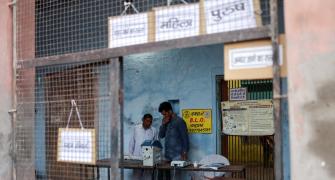How many people stop to think before they strike a match? And if they do pause for a second before lighting a cigarette or turning on a gas stove, the only brand name likely to come to mind is probably Ship.
It isn't tough to understand why people think of Ship when they think of matches. For decades, Wimco Ltd (makers of Ship, Homelite and a host of smaller regional brands) has dominated the highly fragmented Rs 1,200-crore (Rs 12 billion) matchstick market and protected its dominance with a ring of fire. It had 15 per cent share of the market and sold a mind-numbing 370 crore (3.7 billion) matchboxes last year.
Now, for the first time in decades, Wimco's domination is under threat from a formidable foe. The new challenger is tobacco giant ITC Ltd which is burning its way to the top slot that has been held by Wimco for as long as anyone can remember.
The tobacco company, which fired its first salvo only eight months ago, is already selling over 9 crore (90 million) matchboxes a month all across the country (that's out of about 2 billion matchboxes sold monthly). And it has set itself an ambitious target: to grab between 15 per cent and 20 per cent by year-end.
ITC is moving at lightning speed as it rolls out its matches. In a mere eight months, it has already stretched out to 70 per cent of the country. By year-end, ITC matches will be in stalls and shops across the entire nation.
"Our aim is simple: grab market share from the big players," says Rajiv Gopal, chief executive officer, matches, in ITC Ltd. The foray into matches is being made by a section of the company's paperboards division.
Obviously, ITC starts with some giant advantages in the match industry. To ensure that it gets to the top slot in double-quick time, it is leveraging its mammoth tobacco distribution network to the fullest.
ITC matchboxes will soon be available in a staggering 10 lakh (1 million) outlets around the country (already they can be bought in 900,000 outlets).
Astonishingly, about 40 per cent of these outlets are in rural India -- even the largest FMCG majors like Hindustan Lever don't have such a long reach.
That's only for starters. ITC is also pushing five different brands with names like Aim to Ikno that will be sold at prices between 50 paise and Rs 1.50. To make sure that consumers hear about ITC's new brands, the company will spend about Rs 5 crore (Rs 50 million) on high-decibel ad campaigns that will appear on television, radio and in print.
Eight months ago, ITC started by getting matches made at about 28 small units, mostly in Tamil Nadu. Now, it's about to boost production by about 40 per cent and it wants to hire manufacturers in different parts of the country. Matchmaking is reserved for the small-scale sector.
Can ITC unseat Wimco from the top slot? The fact is that Wimco -- the world's largest match manufacturer -- is vulnerable. For one thing, the match industry is growing at barely 1 per cent per annum.
That is because cigarette and bidi sales have fallen in the last few years and, therefore, fewer matches are being used. Also, more people are using lighters nowadays.
Worse, margins in the industry have fallen from around 3 per cent (net) to a mere 1.5 per cent, as prices have remained virtually stagnant since 1995. So, new players have no option but to wrest market share from others.
What's more, Wimco started losing market share even before ITC muscled into the marketplace. Industry experts say it has been outmanoeuvred by a host of smaller players.
Says Hari Ram, secretary of the All India Chambers of Match Industry in Sivakasi, which represents the small scale units: "Back in the 1980s, Wimco had over 30 per cent of the market. But it has been slowly losing ground both to handmade and semi-mechanised units."
Wimco has had other difficulties. A lockout at its Chennai factory ended only in February, pushing down volumes and profits. Net profit fell to Rs 5 crore (Rs 50 million) in the nine months ending December 2002, compared to Rs 5.7 crore (Rs 57 million) during the same period one year ago.
Wimco executives declined to comment on the changes in the industry. In a cryptic reply, Wimco general manager and company secretary K D Ghag said: "Wimco welcomes competition in the match market. Wimco has a reputation for delivering high-quality matches through its comprehensive distribution network."
But ITC is one company that can outgun Wimco when it comes to distribution networks. ITC has a strong hold on distributors who are heavily dependent on cigarette sales.
Says Gopal: "If trade margins are the same for both us and the competition, and we offer better quality and similar price, we don't see any reason why a retailer will not push our matches."
Gopal also points out that Wimco still uses wholesalers in many areas to reach retailers indirectly. By contrast, ITC's tobacco sales force has a direct relationship with retailers.
Many small competitors agree. Says V V Venkatesan, managing director of Vasan Match works, which sells Joker brand matches: "We do not have the cash to put up our own distribution network. So, we sell only through wholesalers and mostly in metros and not in rural markets where we can not penetrate. That is why we are using our excess capacity to supply to ITC."
But smokers constitute only one part of the market. About 54 per cent of all matches sold are for home use. And housewives -- according to industry experts -- usually buy matches at grocery shops where ITC has no great advantages.
ITC executives disagree with that analysis. They point out that ITC has just made an ambitious foray into foods (through Ashirwad aata and salt and Minto confectionery) and already developed relationships with grocers.
In the rural areas, it's a different story. Most rural markets don't have separate grocery and convenience stores. In these areas, the people selling groceries also stock paan, bidis and cigarettes.
ITC has other advantages that add to its clout. For instance, ITC Bhadrachalam makes the paperboard for the matchboxes as well as the side friction on it.
The new business helps both sides. Bhadrachalam, for instance, will get additional orders from the match division of about 4,000 tonnes of paperboard an annum (out of 2 lakh tonnes that it sells annually).
The match division reckons that it saves about 1 per cent to 2 per cent which is key in a low-margin business. The result: gross margins, which in the industry are around 7 per cent to 8 per cent, are slightly higher for ITC.
Of course, the name of the game is moving up the value chain. ITC hopes its higher-end matches will be classy enough to convince people to put away their lighters.
Secondly, it is trying to offer extra value in the lower-priced segments. Says Kumar: "Our key aim after ensuring reach is to woo customers to move up the value chain and change the dynamics of the market."
For instance, ITC's Ikno brand priced at Rs 1.50 will use imported sticks and high quality packaging. Also, the company is trying to turn the matchboxes into collector's items with information on subjects like historical monuments on one side of the box.
Then, ITC is trying to stay ahead in the quality game. Company executives say that the entry-level brand, Aim, offers a side friction panel which can be used for 200 strikes compared to the 130 strikes offered by most competitors.
Secondly, its matches light in one stroke compared to the industry average of three to four strikes. It is also putting jokes and puzzles on some boxes.
ITC is also making special efforts to woo housewives. One brand, Mangaldeep, offers recipes and tips on cleanliness. And the company's wax matches (the Vaxlit brand) have longer sticks than the competitors.
Also in the pipeline are new alternatives that will make a debut in the Indian market. It is looking at non-sulphurous environmental friendly matches and carborised wax matches (at the moment only wooden matches are carborised) are already being developed by the company's research team.
But does it make business sense for a giant like ITC to enter a stagnating industry? Also, Wimco has one huge advantage over all its rivals: it makes its own matches. Its factory has been in operation long before the sector was reserved for the small-scale sector.
Says an industry insider: "Small scale units charge margins of 2 per cent to 4 per cent and Wimco doesn't have to pay that. That's a cost advantage, which neutralises many of ITC's other advantages." Plus, Wimco has units spread all over the country and saves on freight.
Trade sources say Wimco has already started a fightback. It is offering trade discounts to retailers to ensure loyalty.
ITC executives say the business makes economic sense, because it has the distribution network and, therefore, entry costs are minimal.
Says Kumar: "I believe the market will grow -- even if it is only very little -- for the next 15 years before it plateaus. After all, lighters won't be used for lighting chulhas in rural India for a long time to come."
Of course, the company is aware that it has to pare costs in a low-margin business. That is why it is already working on alternative packaging materials like low-grammage boards.
Secondly, it is negotiating bulk deals to buy the chemicals needed to make matchsticks. Most importantly, it is tying up with small-scale units in every region to reduce freight and inventory costs.
ITC is obviously prepared for a fight and it has already made a dent in the marketplace. The question is whether Wimco will get fired up by the challenge and set the market ablaze again.
Scenting opportunity
It's an industry where about 1,000 brands are fighting it out. It's also an industry where companies like Unilever (in a joint venture) and Reckitt Benckiser have already burnt their fingers.
So, why is ITC trying to muscle into the Rs 1,000-crore (Rs 10-billion) agarbatti business? Sure, it's a big market but can ITC fight the multitude of brands that are turned out by small-scale units around the country?
Cycle, the biggest brand in the agarbatti industry, has only a 5 per cent market share.
V M Rajasekharan, CEO of ITC's agarbatti business, is convinced that the hotels-to-tobacco giant can pull it off.
"We are aiming only at a 4 per cent to 5 per cent market share and we want to be among the top three brands in three years by leveraging our distribution strength. We are also learning from the mistakes that some of the other FMCG companies made," he says.
ITC believes other companies like Reckitt Benckiser made the fatal mistake of trying to sell only premium products. For instance, it sold agarbattis at Rs 10 and didn't offer any cheaper alternatives.
The tobacco giant is playing the game differently. It will make cheaper agarbattis that will retail for about Rs 4 and which will be Re 1 cheaper than other branded rivals. It is also selling more expensive agarbattis that retail for between Rs 4 and Rs 20.
Secondly, the large FMCG companies introduced machine-made agarbattis. These looked nice but didn't rate highly in the fragrance stakes. ITC, on the other hand, is buying from vendors who offer handmade products.
ITC is also leveraging its strengths in the same way that the matchbox division has done. It plans to go all across India within the next six months (it started rolling out only in February this year) and will also use the 1 million tobacco outlets to sell its products. And it will spend about 10 per cent of its budget advertising on radio and television.
That isn't all. The company is using high-quality plastic films for packaging, which ensures that the fragrance lasts for a long time. Executives also say that its agarbattis will burn for 40 minutes compared to the industry average, which is five minutes less.
Agarbattis will never be more than a tiny part of ITC's portfolio. But they are crucial as part of the bouquet of products being sold through the company's giant distribution network. Still, it's tough to predict whether agarbattis will leave the sweet scent of success or the stink of failure for ITC.







